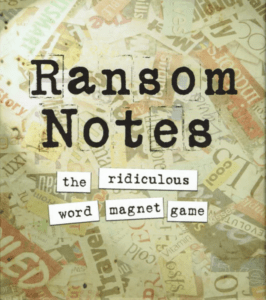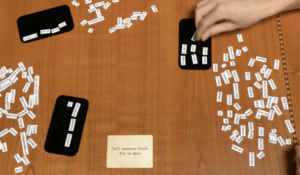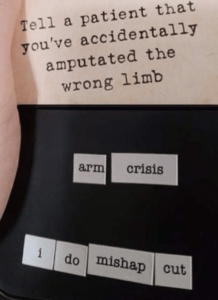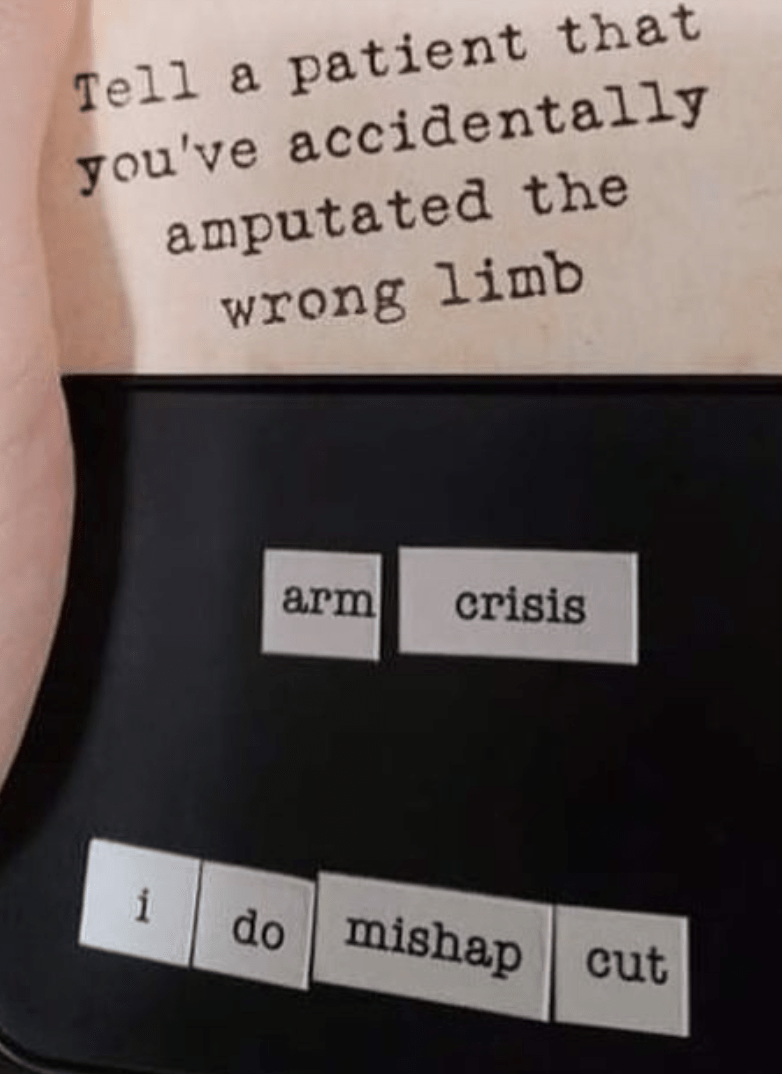
I played Ransom Notes, a judging social board game by Evan and Josh, co-founders of Very Special Games. The target audience is adults, with a listed age range of 17 plus. Although the mechanics of the game aren’t complicated, some of the prompts are a bit raunchy, which is likely where the age range comes in.
Player count: 3-6
Actions: Assemble word magnets onto your board, anonymously submit it. If you’re the judge, choose a winner.
Rounds/Procedures: Each round there is one judge (which rotates each round), while everyone else assembles ransom notes. The judge picks a card from the deck, which gives a prompt (i.e., “Company explains a Ferris wheel accident” or “The tagline for Guy Fieri’s new show”) that the players have to respond to with the magnetic tiles they’ve been dealt. Everyone submits their note anonymously on a magnet board, and then the judge chooses their favorite to win.

Objective: Win 3 rounds.
Resources: The main resource is the set of magnetic word tiles each player gets. They’re distributed at the beginning of the game at random, and stay constant throughout the game.
This adds an interesting constraint – a lot of the time you won’t get the articles you need, for example, which leads to sentences that genuinely sound like ransom notes. The awkwardness of the language people have to use makes it funnier, and encourages people to develop specific reputations in game or in-jokes based on what tiles they have (i.e., one player had two copies of ‘Daddy’ so you could usually tell which message was theirs, and they set the tone for their notes).
The main type of fun this is targeting is fellowship – it’s a game specifically designed for having fun with friends, not to be taken seriously. It’s great hearing what people come up with, and the judging was a blast. That said, it doesn’t encourage people to talk outside of the game – there was definitely a pattern where people would go silent as they figured out their sentences, and then only talk once everything was submitted. So, it was social, but definitely had lulls.
There was also an element of sensation – the simple act of placing magnets onto the little boards was satisfying, and hit some very basic kindergarten-level instincts. It really speaks to the value of looking at alternative pieces for a game.
As I mentioned earlier, the basic mechanic of the game – making notes with restricted vocabulary – works very well, and really lends itself to inventive answers. It allows for more creativity – or at least, a different kind of creativity – than Apples to Apples or Cards Against Humanity. Especially compared to the latter, where it often feels like the answers on the cards are what’s funny, and the player themselves is just curating them, Ransom Notes felt like it gave a lot more room for players themselves to come up with interesting answers. People were more invested in their answers, and they worked hard to craft compelling responses.
There were also opportunities to be expressive just in how the words were placed on the board (see below). It was remarkable how much people could express with placement and spacing of the type.

That strength – lots of creative decisions – was a double-edged sword. Because it had a lot more of a mental load people chatted a lot less during the game. It was an activity in and of itself, rather than a social lubricant. This may not be entirely fair – we played it with 9 people, so we had three teams of two who always took longer to decide on their notes, so it’s possible this issue would be alleviated with single person teams.
Everyone playing also knew each other well – I think if people were strangers this could work better. It gives people ready-made things to chat about, and doesn’t require people to get too vulnerable. Although there is some level of vulnerability in being judged for your humor, the fact that you have a constrained set of words to choose distances players from their answers in a way that gives them some protection, which I’d imagine is particularly valuable when just meeting people, or if you’re uncomfortable.
Given that, I don’t think I would try to change this dynamic. This isn’t meant to be a game where chatting is the main type of socializing, and I think changes would detract from what already works. Instead, I would tweak it. I think fewer obviously ‘funny in and of themselves’ words – i.e., daddy – would help make people come up with their own interesting answers, and encourage more creativity versus relatively cheap laughs. This is my personal preference as someone who thinks Cards Against Humanity is a strictly worse Apples to Apples, but I think it would lean into the freedom and creativity the game promotes.



